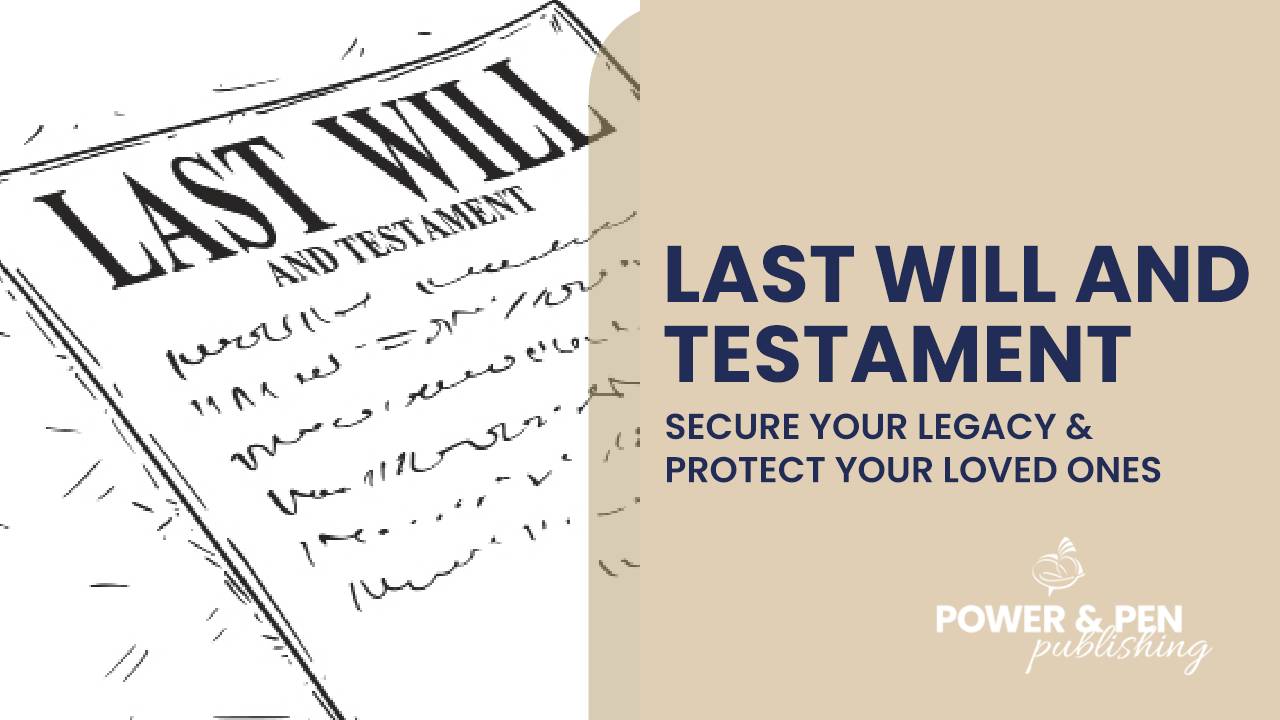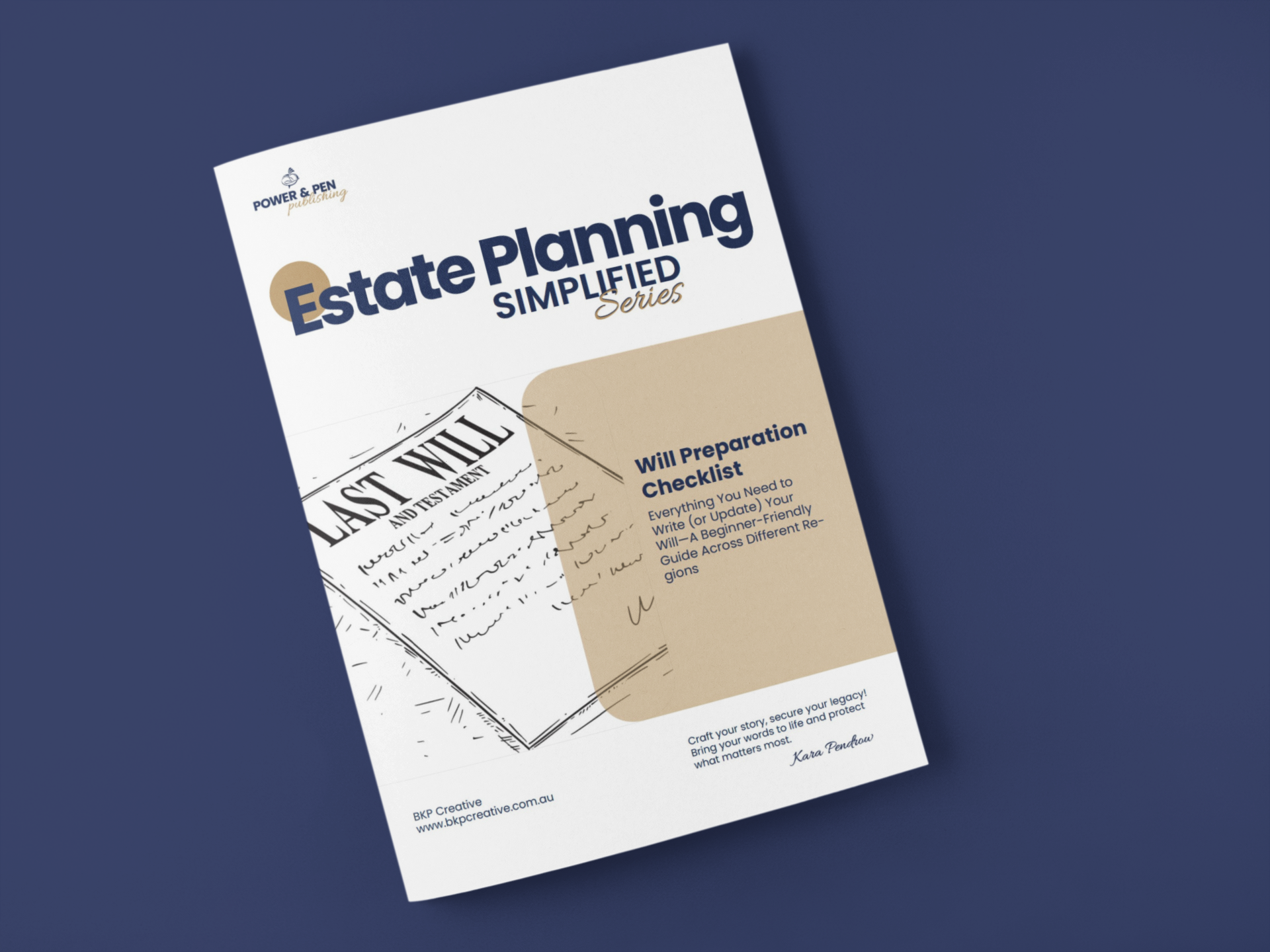
Understanding the Last Will and Testament
Mar 18, 2025Learn what a Will is, why it’s vital, and how to draft one. Secure your family’s future and avoid legal pitfalls—start planning today!”
Table of Contents
- Introduction
- What Is a Last Will and Testament?
- Why You Need a Will
- Elements of a Valid Will
- Choosing an Executor
- Common Mistakes and Pitfalls
- When and How to Update Your Will
- Your Will Preparation Checklist (Free Download!)
- Additional Resources and Next Steps
- Relevant Government Links
- Conclusion & Disclaimer
* Please note, this site uses Amazon Affiliate links and we may receive a commission if you use them
1. Introduction
A Last Will and Testament—often called a Will—stands at the heart of most estate plans. It outlines how you want your property distributed, names the person who will manage your estate, and can even appoint a guardian for minor children. Despite its importance, an alarming number of people never draft a will or keep it updated, leaving their families exposed to legal uncertainties and emotional stress.
In this blog post, we will clarify the role of a Will, break down its essential elements, reveal common mistakes to avoid, and guide you on how and when to update your Will. You’ll also discover our free Will Preparation Checklist—a streamlined resource to help you confidently craft or refine your will.
Cross-Reference: If you’re new to the concept of estate planning, check out Blog #1: Estate Planning Basics: What It Is and Why It Matters for a foundational overview. Stay tuned for Blog #3: Living Trusts & Other Trusts: Pros & Cons to explore additional tools that complement your Will.

2. What Is a Last Will and Testament?
A Last Will and Testament is a legal document detailing your wishes regarding the distribution of your assets and the care of any dependents after your death.
In most jurisdictions:
- You (the “testator”) must be over a specific legal age (commonly 18) and possess the mental capacity to create a valid will.
- The will designates beneficiaries (individuals or organizations) who inherit your assets.
- It names an Executor—also called a personal representative—who is responsible for carrying out your instructions, settling debts, filing taxes, and distributing property.
- It can appoint guardians for minor children or dependents with special needs.
Key Purposes of a Will
- Asset Distribution: Decide who gets what—real estate, savings, sentimental heirlooms, or even digital assets.
- Guardian Appointment: If both parents are unavailable, specify who will care for any minor (under 18 years) children.
- Executor Appointment: Choose someone you trust to navigate legal processes and finalize your affairs.
- Peace of Mind: Prevent conflict among surviving family members and minimize ambiguity or disputes.
Note: A Will generally does not override specific beneficiary designations (like life insurance or retirement accounts). Keeping beneficiaries updated is crucial to an effective overall plan.
3. Why You Need a Will
Dying without a will (intestate) means state or provincial laws determine asset distribution, often leading to:
- Unintended heirs: Assets might pass to relatives you didn’t intend to benefit.
- Additional legal costs: Courts must appoint an administrator to manage your estate, potentially incurring more fees.
- Family disputes: Relatives may disagree about who should inherit specific items or handle finances.
- Delayed distribution: Probating an intestate estate can take significantly longer.
By creating a valid will, you ensure that your assets and loved ones receive the care and protection you intend without unnecessary legal entanglements or stress.
4. Elements of a Valid Will
While specific requirements vary by country and region, a valid will typically needs:
- Proper Age & Mental Capacity
- You must meet the legal minimum age (usually 18).
- You must be of sound mind to understand the nature and consequences of making a Will.
- Written Document
- Most places require a written Will (typed or handwritten).
- Some jurisdictions allow “holographic wills” (entirely handwritten and signed), but they often face more legal scrutiny.
- Clear Statement of Intent
- A phrase indicating “This is my last will and testament,” establishing the document’s intent.
- Signature and Witnesses
- Your signature must appear at the end.
- Witnesses: Typically, two witnesses (sometimes three) who are not beneficiaries or potential heirs. In some areas, the Will may also need notarization.
- Appointment of Executor
- The individual you name to handle estate administration, pay debts, and distribute assets.
- Asset Distribution and Beneficiary Details
- Lists who receives which assets (house, personal belongings, investments, etc.).
- May also address contingent beneficiaries if the primary heirs pass away before you.
Pro Tip: An attorney or solicitor can ensure your will meets all local rules. This helps avoid challenges or invalidation in probate.
5. Choosing an Executor
Your Executor (personal representative) is critical to a successful estate administration. Look for someone who is:
- Organized and detail-oriented: They’ll manage finances, inventory assets, and file legal documents.
- Trustworthy: They have a fiduciary duty to follow your wishes and act in the estate’s best interest.
- Financially literate: They’ll handle taxes, creditor claims, and final accounting.
- Emotionally stable: Grief can complicate responsibilities, so ensure they can handle potential family tensions.
Professional Executor Option
If no suitable family member or friend is available or willing, consider appointing a professional executor, such as a trust company or law firm. While this incurs additional fees, it can offer professional expertise and minimize personal conflicts.

6. Common Mistakes and Pitfalls
Even a well-intentioned Will can cause headaches if you overlook crucial details.
Here are some frequent errors:
- Failing to Update
- Major life changes—marriage, divorce, new children, or significant assets—require updates to reflect your current wishes.
- Choosing the Wrong Executor
- Someone who’s too busy, financially irresponsible, or who may have conflicts of interest can prolong probate or create family tension.
- Vague or Contradictory Language
- Ambiguous terms can lead to legal challenges. Write clearly and review your wording with a legal professional.
- Overlooking Beneficiary Designations
- Always align your will with named beneficiaries on life insurance, retirement accounts, or payable-on-death (POD) bank accounts.
- Not Considering Digital Assets
- Online banking, social media, or cryptocurrency can be lost if not addressed in your estate plan.
- Lack of Proper Witnessing
- Some states or provinces invalidate a Will if it’s not witnessed correctly or if the witnesses are also beneficiaries.
When and How to Update Your Will
A Will is not a “set it and forget it” document. You should revisit and possibly amend (through a codicil) or replace your Will entirely if:
- Marriage or Divorce
- Marriage can render your old Will void in some jurisdictions; divorce often alters beneficiary designations.
- New Children or Dependent
- You may want to name a guardian or include them in your inheritance.
- Significant Asset Changes
- Purchasing a new property, inheriting wealth, or selling businesses.
- Relocation
- Different states or countries might have unique legal requirements that necessitate rewriting or revalidating your Will.
- Executor or Beneficiary Changes
- If your chosen Executor can no longer serve or if a beneficiary passes away, revise accordingly.
Frequency: Review your Will every 3–5 years even if there are no major life events, just to confirm it still aligns with your goals.

8. Your Will Preparation Checklist (Free Download!)
Ready to create or refine your Will? We’ve compiled a step-by-step Will Preparation Checklist to simplify the process. This FREE resource covers everything from document requirements to beneficiary reviews.
Download your FREE Will Preparation Checklist here!
What’s Inside:
- Asset Inventory Worksheet
- Log real estate, bank accounts, investments, vehicles, personal items.
- Debts & Liabilities Organizer
- Keep track of mortgages, loans, credit cards, and other obligations.
- Executor & Guardian Selection
- Criteria for choosing trustworthy individuals.
- Beneficiary Designation Reminders
- Ensure consistency across policies, retirement accounts, and your will.
- Witnessing & Signing Guidelines
- Avoid common technical pitfalls that can invalidate your will.
Already started your estate plan? Don’t forget to read Blog #1: Estate Planning Basics: What It Is and Why It Matters for a broader overview of estate planning documents, and look out for Blog #3: Living Trusts & Other Trusts: Pros & Cons to learn how Trusts can complement your will.
9. Additional Resources and Next Steps
- Talk to a Professional: While DIY solutions exist, professional guidance ensures you comply with regional laws and best practices.
- Communicate: Let your Executor and key family members know where to find your Will.
- Store Securely: Keep your signed Will in a fireproof safe or safety deposit box—ideally with copies for your executor or attorney.
10. Relevant Government Links
Because estate laws vary by jurisdiction, here are official links to help you explore further:
- United States
- American Bar Association – Wills
- IRS – Estate and Gift Taxes
- IRS - Estate Tax Information - Thresholds
- United Kingdom
- Australia
- Moneysmart.gov.au – Wills & Powers of Attorney
- Moneysmart.gov.au - Paying for your funeral
- Australian Taxation Office - Inherited assets and capital gains tax
- Canada
- New Zealand
These resources provide country-specific guidance and up-to-date legal requirements.
11. Conclusion & Disclaimer
A Last Will and Testament is a cornerstone of estate planning, ensuring your family’s financial security and abiding by your personal wishes.
By choosing an Executor wisely, updating your Will when necessary, and aligning your beneficiaries, you sidestep the delays and disputes that often accompany intestacy.
Disclaimer: This blog provides general information and does not constitute legal advice. Always consult a licensed attorney or solicitor in your local jurisdiction to confirm your Will meets all legal requirements.
Stay connected with news and updates!
Join our mailing list to receive the latest news and updates from our team.
Don't worry, your information will not be shared.
We hate SPAM. We will never sell your information, for any reason.


